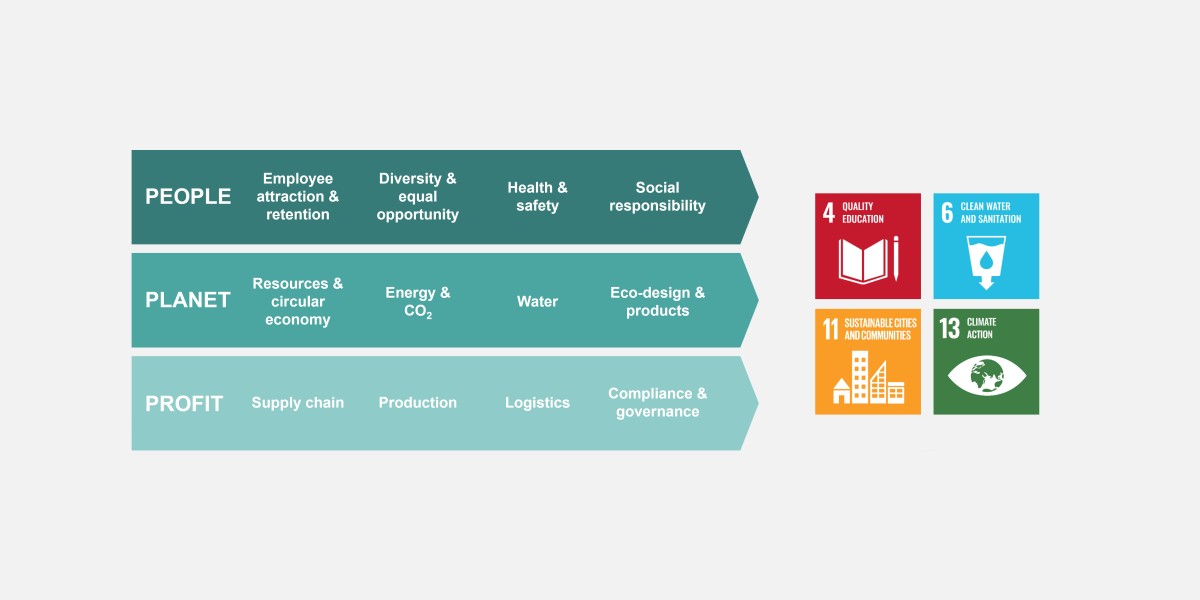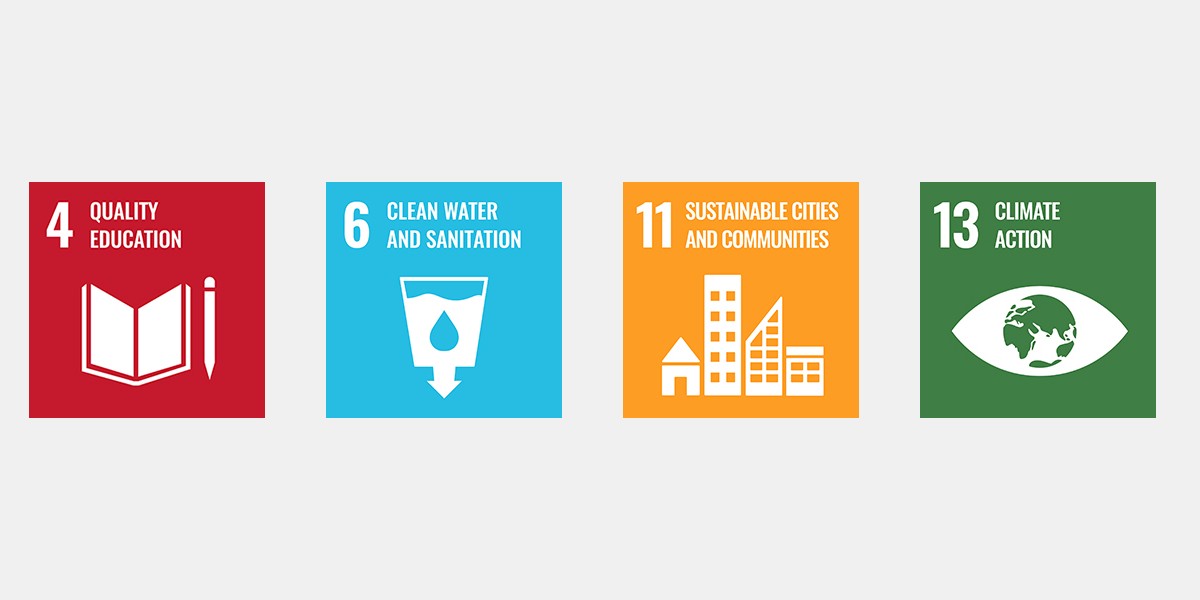
Sustainability strategy
Geberit began implementing its first environmental strategy with concrete measures as early as 1990. This has gradually evolved into a comprehensive sustainability strategy over the years and is now integrated into the company’s overall strategy as a defining element of its corporate culture.
The sustainability strategy is based on a total of twelve sustainability modules, which fall under the following three dimensions:
- the social dimension (People),
- the ecological dimension (Planet) and
- the economic dimension (Profit).

- People
- Planet
- Profit
- Sustainable Development Goals
People The social dimension
People are at the centre of Geberit. This is why the company invests in the personal development of its employees, supporting them at every stage and level of their careers to achieve their full potential and grow as individuals.
Geberit also recognises its responsibility towards society. By collaborating with social institutions and spearheading projects in developing countries to advance access to sanitation, Geberit contributes to enhancing the quality of life for people around the world.
The social dimension of the sustainability strategy encompasses four key modules:
- Attracting and retaining employees
A supportive and inclusive working environment promotes the success of individual employees and the company as a whole. As a responsible employer, Geberit is committed to providing top-tier job prospects. These include attractive working conditions, a corporate culture of mutual respect and collegiality, as well as training and further education opportunities. Read more - Diversity and equal opportunities
Geberit strives to ensure equality of opportunity regardless of gender, age, origin, religion, or sexual orientation. The company promotes a culture that values the skills, contributions, and potential of all employees and regards the labour market integration of disadvantaged people as part of its social commitment. In addition to creating jobs for people with disabilities, the company awards contracts to organisations that offer such jobs. In total, over 600 people with disabilities work for Geberit. Read more - Occupational health and safety
Geberit operates safe production plants and logistics sites, promoting a health and safety culture at a high level. The company is continuously enhancing its workplace health protection initiatives and ergonomics, and its preventative measures and training have led to a 47% reduction in the accident rate since 2015. Read more - Social responsibility
Geberit also embraces its responsibility towards society by striving to enhance people’s quality of life through its social engagement initiatives. In fact, Geberit employees and apprentices are actively engaged in renovating and building sanitary facilities for social institutions in developing countries. Geberit also contributes to better hygiene standards worldwide through vocational training and the knowledge sharing. Read more
Planet The ecological dimension
Geberit is committed to reducing its ecological footprint throughout the entire value chain. Resource-efficient products, process innovations, advanced waste management, and a high proportion of renewable energy contribute to the ongoing reduction of environmental impact and carbon emissions. In recognition of its sustainability efforts, the company is a regular recipient of a medal through the EcoVadis assessment platform.
The ecological dimension of the sustainability strategy includes the following four modules:
- Resources & circular economy
Geberit adopts a strategic approach to natural resources and prefers to use them as sparingly as possible. In production, the aim is to close internal material cycles, minimise waste and continuously increase the proportion of recycled material. Read more - Energy & CO2
Geberit consistently reduces energy consumption and carbon emissions throughout the entire value chain. With an annual reduction target of -5%, the CO2 strategy represents an integral part of all business processes. Read more - Water
Geberit places great importance on conscientious and economical water management. The company’s relentless focus on reducing water consumption, both in production and throughout the lifespan of its products, represents the company’s most impactful driver for contributing to sustainable development. Read more - Eco-design & products
The eco-design principle takes account of the circular economy, and Geberit has been applying it consistently to the development of its own products since 2007. From the selection of raw materials through to disposal, all aspects are checked with regard to their ecological criteria. The aim is for every new product to be ecologically better than its predecessor. Read more
Profit The economic dimension
For Geberit, sustainability means adopting a long-term and future-orientated approach. All decision-making processes take economic, ecological and social aspects into account. Alongside ensuring long-term profitability, the company creates value for its stakeholders by delivering innovative products to customers, offering training and education for installers, planners and architects, providing opportunities for employees at production sites across different regions, and fostering equitable partnerships with suppliers and business partners.
The economic dimension of the sustainability strategy includes the following four modules:
- Supply chain
The Geberit Code of Conduct for Suppliers, which is binding for everyone, includes concrete specifications on quality and compliance with environmental, employment law and social requirements, and stipulates compliance with human rights. - Production
Geberit sources, constructs, and operates durable, high-quality and efficient infrastructure such as buildings, facilities and tools. The company attaches great importance to continuously optimising all production processes, with best practices shared and refined across the board. - Logistics
Geberit is committed to optimising its logistics processes in terms of energy consumption, emissions and packaging. Since 2015, Geberit has succeeded in improving the environmental efficiency of its logistics practices (environmental impact per tonne-kilometre) by 37%. Centralised logistics along with a reduction of packaging quantities and transport kilometres are all crucial factors in this endeavour. - Compliance & Governance
Geberit complies with all laws, directives, norms and standards. Geberit reviews the effectiveness of its internal control systems and guidelines and takes appropriate measures in the event of misconduct. Responsible and forward-thinking corporate leadership enhances the resilience of Geberit’s business model and thereby the long-term value creation of the company.
Sustainable Development Goals Geberit’s contribution
Geberit’s activities and achievements support the UN Sustainable Development Goals (SDGs) outlined in the 2030 Agenda for Sustainable Development. As an international leader in the sanitary sector, Geberit is notably committed to the following sustainability goals:

Further information can be found in the SDG Reporting 2024
